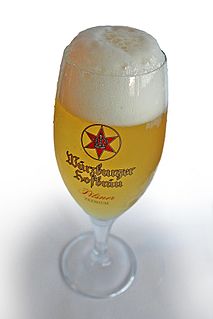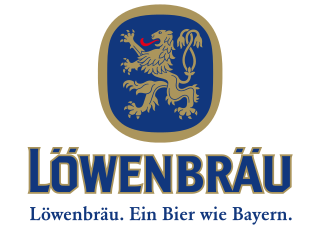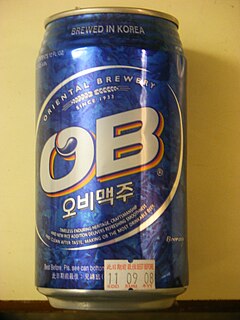
Bock is a strong beer in Germany, usually a dark lager. Several substyles exist, including:

Wheat beer is a top-fermented beer which is brewed with a large proportion of wheat relative to the amount of malted barley. The two main varieties are German Weizenbier and Belgian witbier; other types include Lambic, Berliner Weisse, and Gose.

Pale lager is a very pale-to-golden-colored lager beer with a well-attenuated body and a varying degree of noble hop bitterness.

Märzen or Märzenbier is a lager that originated in Bavaria. It has a medium to full body and may vary in color from pale through amber to dark brown. It was the beer traditionally served at the Munich Oktoberfest.

Helles or hell is a traditional German pale lager beer, produced chiefly in Southern Germany, particularly Munich. The German word hell can be translated as "bright", "light", or "pale".

The Staatliches Hofbräuhaus in München is a brewery in Munich, Germany, owned by the Bavarian state government. The Hof (court) comes from the brewery's history as a royal brewery in the Kingdom of Bavaria. The brewery owns the Hofbräuhaus am Platzl, the Hofbräukeller and one of the largest tents at the Oktoberfest (Hofbräu-Festzelt).

Spoetzl Brewery is a brewery located in Shiner, Texas, U.S. It produces a diverse line of Shiner Beers, including their flagship Shiner Bock, a dark lager that is now distributed countrywide. The brewery is owned by the Gambrinus Company, a family-owned company based in San Antonio, which also owns Trumer Brewery in Berkeley, California.

Löwenbräu is a brewery in Munich. Its name is German for "lion's brew". Most Löwenbräu beers are marketed as being brewed according to the Reinheitsgebot, the German beer purity regulation of 1516.

Spaten-Franziskaner-Bräu GmbH is a brewery in Munich, Bavaria, Germany. Its products are beers of the brands Spaten and Franziskaner.

Beer is a major part of German culture. German beer is brewed according to the Reinheitsgebot, which permits only water, hops, and malt as ingredients; and stipulates that beers not exclusively using barley-malt, such as wheat beer, must be top-fermented.

Augustiner-Bräu is a brewery in Munich, Germany. Established in 1328, it is Munich's oldest independent brewery. The company is owned by the Edith Haberland Wagner Trust 51% and the Inselkammer-Family 49%.

Oriental Brewery or OB is a South Korean brewery currently owned by AB InBev, and initially founded by Doosan Group.

The Lancaster Brewing Company is a brewery and pub located in Lancaster, Pennsylvania that produces beer and serves food. The brewery produces over 20 different beers throughout the year, with up to 20 beers available inside the restaurant at any one time. Lancaster Brewing Company beer can be found throughout the Mid-Atlantic region with distribution in Pennsylvania, New Jersey, New York, Washington, D.C., Delaware, Maryland, Virginia, and West Virginia. The brewery and the restaurant are located in the historic Edward McGovern Tobacco Warehouse, listed on the National Register of Historic Places in 1990. The area has a long history of local brews and this is the first brewery to open in nearly 40 years.

Mash ingredients, mash bill, mashbill, or grain bill are the materials that brewers use to produce the wort that they then ferment into alcohol. Mashing is the act of creating and extracting fermentable and non-fermentable sugars and flavor components from grain by steeping it in hot water, and then letting it rest at specific temperature ranges to activate naturally occurring enzymes in the grain that convert starches to sugars. The sugars separate from the mash ingredients, and then yeast in the brewing process converts them to alcohol and other fermentation products.

The Ayinger Brewery is a brewery in Aying, Bavaria, Germany, about 25 km from Munich. Approximately 10% of Ayinger beers are exported, mainly to Italy, the United States, and the rest of Europe. Ayinger beers have been frequent award winners in international beer competitions.
Panama produces three brands of rum and a similar liquor known as Seco Herrerano, but beer is also quite popular. There are multiple brands produced by six companies.

Lager is beer which has been brewed and conditioned at low temperature. Lagers can be pale, amber, or dark. Pale lager is the most widely consumed and commercially available style of beer. The term "lager" comes from the German for "storage", as the beer was stored before drinking – traditionally in the same cool caves it was fermented in.
Dundee was a Rochester, New York–based brewing company that produced ales and lagers. It was part of the Genesee Brewing Company, owned by North American Breweries which started marketing the brand's first lager in 1994 as J.W. Dundee's Honey Brown. Honey Brown quickly gained a good reputation and won awards, most notably the gold medal at the 2004 World Beer Cup.

Golan Brewery is a brewery in the Golan Heights settlement of Qatzrin. It won the award for Best Israeli Brewery at the BIRA 2011 competition.

The Klosterbrauerei Andechs is a monastic brewery in Andechs, Upper Bavaria, Germany, well known for its Andechser beers. The brewery is run by the monks of Andechs Abbey, a priory of St. Boniface's Abbey, a Benedictine abbey situated 40 km away in Munich. It is the only monastic brewery in Germany that brews Bock beer year-round for nationwide distribution. Every year, the brewery produces over 100,000 hectolitres (85,000 US bbl) of beer. A portion of the beer is served on-site at the abbey; the remainder is exported throughout Germany and worldwide.


















